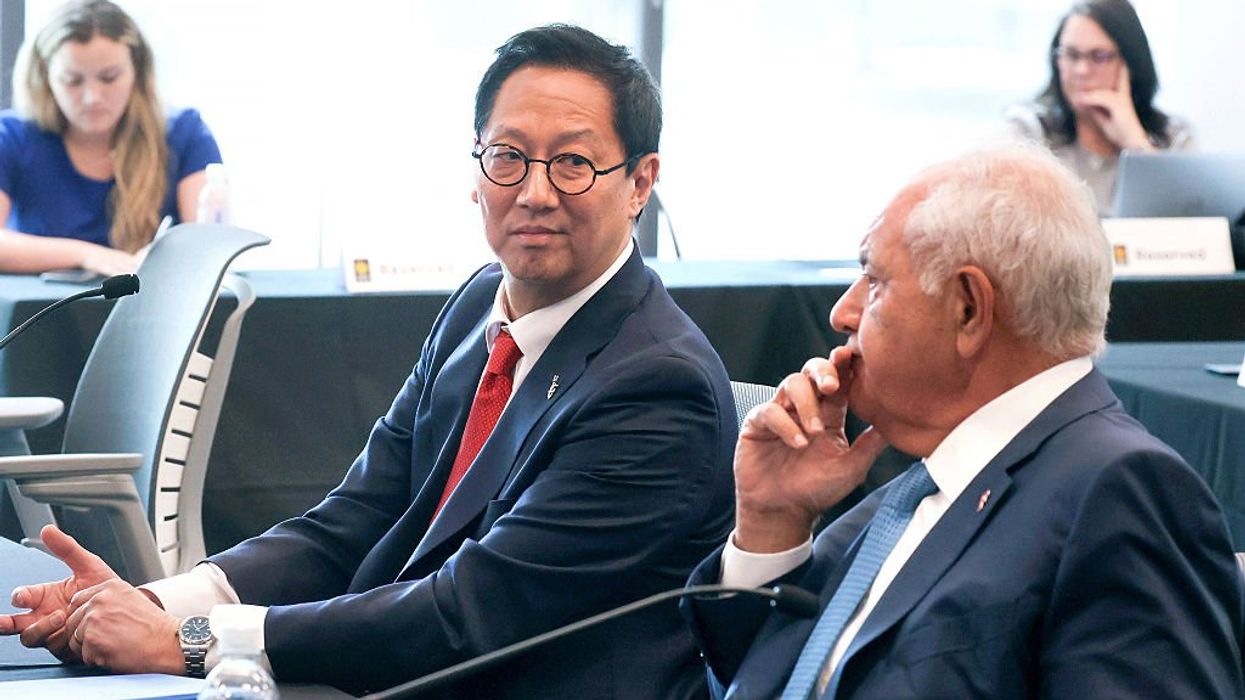As the Islamic State of Iraq and Syria terror groups continues violence in the Middle East, Israel fends off attacks from Hamas, and America itself faces a crisis on the southern border, White House press secretary Josh Earnest told reporters that President Barack Obama has improved global tranquility.
 Iraqi's who have who fled recent fighting near the city of Mosul are try to enter a temporary displacement camp on July 3, 2014 in Khazair, Iraq. The families, many with small and sick children, have no shelter and little water and food. (Spencer Platt/Getty Images)
Iraqi's who have who fled recent fighting near the city of Mosul are try to enter a temporary displacement camp on July 3, 2014 in Khazair, Iraq. The families, many with small and sick children, have no shelter and little water and food. (Spencer Platt/Getty Images)
“There have been a number of situations in which you've seen this administration intervene in a meaningful way that has substantially furthered American interests and substantially improved the, you know, the tranquility of the global community,” Earnest said Monday.
Earnest cited three reasons for this he said he “thought of off the top of my head.”
From the administration's view, the successes are:
1. Dealing with Syria's chemical weapons stockpile in 2013:
“We saw the United States intervene with the support of our allies and partners to rid Syria of their declared chemical weapons stockpile,” Earnest said. “For a long time, for decades, the Assad regime denied that they even had chemical weapons. Again, working with our partners and allies, he declared that he had these weapons and worked with the international community to remove these weapons and they are currently being destroyed aboard a U.S. ship out at sea.”
2. Secretary of State John Kerry negotiating an election audit in Afghanistan over the weekend:
“Over the weekend, you saw Secretary Kerry travel to Afghanistan and mediate an agreement between the two presidential candidates in Afghanistan, keeping that process alive, and in fact advancing that process, reaching an agreement to audit every single ballot in a presidential election in which 8 million ballots across the country were cast is a substantial, meaningful agreement and puts in sight a resolution of what had been a pretty dangerous disagreement,” Earnest said.
3. A meeting between Secretary of State Kerry and Treasury Secretary Jack Lew with Chinese officials last week.
“And just last week you saw the Secretary of Treasury and the Secretary of State meeting in China with their counterparts to work through the robust but complex relationship that the United States has with China,” Earnest said. “Those were serious negotiations and their were serious efforts to advance American interests in the Asian Pacific.”
The Wall Street Journal ran a frontage news analysis headlined, “Obama Contends With Arc of Instability Unseen Since '70s” that featured interviews with several foreign policy experts.
“A convergence of security crises is playing out around the globe, from the Palestinian territories and Iraq to Ukraine and the South China Sea, posing a serious challenge to President Barack Obama's foreign policy and reflecting a world in which U.S. global power seems increasingly tenuous,” the Journal story said.
“The breadth of global instability now unfolding hasn't been seen since the late 1970s, U.S. security strategists say, when the Soviet Union invaded Afghanistan, revolutionary Islamists took power in Iran, and Southeast Asia was reeling in the wake of the U.S. exit from Vietnam,” the Journal continued. “In the past month alone, the U.S. has faced twin civil wars in Iraq and Syria, renewed fighting between Israel and the Palestinians, an electoral crisis in Afghanistan and ethnic strife on the edge of Russia, in Ukraine. Off center stage, but high on the minds of U.S. officials, are growing fears that negotiations with Iran over its nuclear program could collapse this month, and that China is intensifying its territorial claims in East Asia.”
Speaking of the Wall Street Journal, Earnest said, “They're not exactly an impartial source.”
A reporter later asked, “You don't think Syria is tranquil do you?”
Earnest said, “No, I didn't say that.”
“I would acknowledge readily that there is a lot of conflict and instability in hot spots all over the globe,” he said. “But it has not eliminated the United States ability or the president's ability to look out for and even advance American interests and a variety of regions across the globe.”
Follow Fred Lucas (@FredVLucas3) on Twitter

 Iraqi's who have who fled recent fighting near the city of Mosul are try to enter a temporary displacement camp on July 3, 2014 in Khazair, Iraq. The families, many with small and sick children, have no shelter and little water and food. (Spencer Platt/Getty Images)
Iraqi's who have who fled recent fighting near the city of Mosul are try to enter a temporary displacement camp on July 3, 2014 in Khazair, Iraq. The families, many with small and sick children, have no shelter and little water and food. (Spencer Platt/Getty Images)





